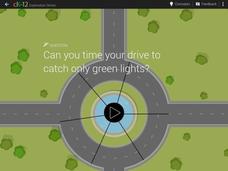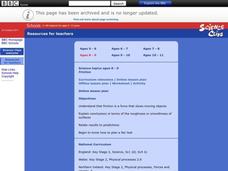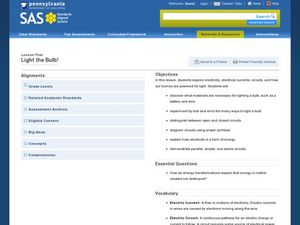CK-12 Foundation
Angular Speed Simulation
Can you time the speed of your car perfectly so you only hit green lights? The challenge in the simulation is to alter the timing of the lights or the speed of the car in order to do just that. Scholars learn about angular speed as they...
NASA
Blinded by the Light!
Pupils learn of multiple ways astronomers look for planets outside of the solar system. By completing a hands-on activity, scholars discover that trying to see the planets directly because of the glare from the nearby star is nearly...
Curated OER
Red Light, Green Light
Learners investigate the friction between tires and the road and how it affects the movement of cars while driving. They discuss and define friction, experiment with sandpaper and wax paper to determine which material provides the least...
Curated OER
WHAT MAKES A LIGHT BULB LIGHT?
Middle schoolers are able to use inquiry to answer the essential questions. They are able to predict and test configurations of a battery, bulb, and wire that make the complete circuit. Students craft a group and individual theory of a...
Curated OER
Newton's Hat Trick
Learners are challenged to develop skits illustrating each of Newton's three laws of motion. They are asked to identify examples of Newton's laws in sports. Students are asked how does Newton's third law allow a runner to run?
NASA
The Science of the Sun
There's more to that glowing ball of light in sky than most children realize. From the overall structure of the solar system, to the changing of the seasons, these hands-on lessons open the eyes of young scientists to...
Curated OER
What is Retrograde Motion
In this retrograde motion worksheet, students draw a diagram of the night sky by connecting dots to show retrograde motion. They compare retrograde motion to an optical illusion and answer questions about both.
Curated OER
Motion Picture Analysis Worksheet
In this motion picture analysis worksheet, learners decipher what type of motion picture they viewed based on a complete list of criteria. Students then answer multiple questions based on their discoveries.
Curated OER
Worksheet for Analysis of a Motion Picture
In this primary source analysis worksheet, learners respond to 14 short answer questions that require them to analyze the motion picture of their choice.
Curated OER
The Wonderful World of Waves (Wave Basics)
Students define amplitude, wavelength, frequency, and period, calculate period given frequency, and calculate frequency given period, define crest and trough and locate both on diagram of wave, differentiate between latitudinal and...
Curated OER
Newton's 2nd Law
Fourth graders explore Newton's second law of motion, testing and identifying the characteristics of objects that makes them easier or harder to push. They identify what types of objects are the hardest to move, then test a variety of...
Curated OER
When Things Start Heating Up
Young scholars explore how and why heat is produced from things that give off light, from machines, or when one thing is rubbed against another. They participate in several hands-on activities designed to help them realize that heat is...
Curated OER
Forces in Action
Students investigate questions centered around force and motion by going through the scientific process and creating fair tests and experimentation. In this instructional activity about forces-in-action, students diagram their findings...
Curated OER
Friction
Students compare and contrast the movement of objects on different surfaces, experimenting with friction and forces of motion. This friction lesson has numerous online tools including worksheets and virtual activities; the option is also...
K12 Reader
How Things Move
As part of a comprehension exercise, kids read a physical science article about motion and then answer a series of comprehension questions based on the passage.
Teach Engineering
Ramp and Review (for High School)
Rolling for momentum. As part of a study of mechanical energy, momentum, and friction, class members experiment rolling a ball down an incline and having it collide with a cup. Groups take multiple measurements and perform...
National Nanotechnology Infrastructure Network
Jell-O® Waveguide and Power Loss
Jell-O® can help model the transmission of light through fiber optic cables. Young scientists use the jiggly dessert to make a waveguide to transmit a laser beam from one point to another. Their models help them learn the function...
IOP Institute of Physics
Physics in Concert
What do physicists and musicians have in common? A lot more than you might think. After first viewing a slide show presentation and completing a series of skills practice worksheets on the physics of light, sound, and...
American Museum of Natural History
Train of Thought
Hop aboard the train of thought. A remote learning resource has learners consider thought experiments to consider scientific theories. It provides two examples, one on orbiting bodies and the other on the speed of light, for them to work...
American Museum of Natural History
What is Astronomy?
Go study the universe. Pupils learn seven aspects about astronomy and astronomers. They begin to learn about constellations; distance and motion between objects; gravity; the electromagnetic spectrum; dark matter and energy; and teams of...
Curated OER
World In Motion Curriculum
Young scholars explore the night sky and its solar system. Using a Digitarium planetarium system, students observe four constellations. They discover the phases of the moon and eclipses. Young scholars recognize the difference between...
Pennsylvania Department of Education
Light the Bulb!
Third graders investigate electrical circuits and how light bulbs are powered. In this electricity and power instructional activity, 3rd graders study the vocabulary necessary which includes the different types of circuits, electrical...
Curated OER
Physical Setting: Physics Exam 2004
Twelve pages of mostly multiple-choice questions comprise this comprehensive New York Regents physics exam. It covers an entire year's worth of physics curriculum and requires about three hours for completion. Review the questions to...
Curated OER
Polarized Light
Students study polarized light and explain how they know it is polarized. In this polarized light lesson students complete a lab that shows them how light can be polarized.

























